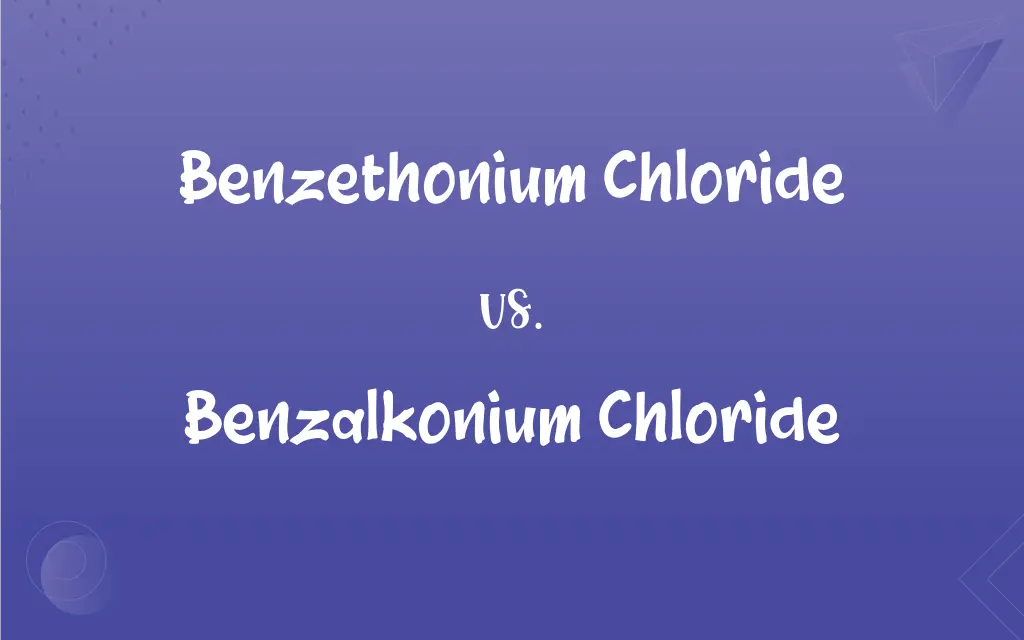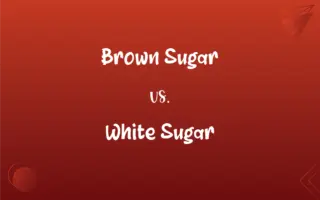Benzethonium Chloride vs. Benzalkonium Chloride: What's the Difference?
Edited by Aimie Carlson || By Janet White || Published on February 8, 2024
Benzethonium chloride is a synthetic quaternary ammonium salt used as an antimicrobial agent, while benzalkonium chloride is a mixture of alkylbenzyldimethylammonium chlorides with similar uses.

Key Differences
Benzethonium chloride is a synthetic quaternary ammonium compound with a specific chemical structure (C27H42ClNO2). Benzalkonium chloride, on the other hand, is a mixture of alkylbenzyldimethylammonium chlorides, where the alkyl group varies in length (C8-C18).
Both compounds are known for their antimicrobial properties. Benzethonium chloride is effective against a broad range of microorganisms, including bacteria and fungi. Benzalkonium chloride also exhibits broad-spectrum antimicrobial activity and is commonly used as a disinfectant and antiseptic.
Benzethonium chloride is used in personal care products, such as hand sanitizers and antiseptic wipes, and in pharmaceutical products. Benzalkonium chloride is widely used in disinfectants, sanitizers, and in preservatives in ophthalmic and nasal preparations.
Both compounds are generally safe when used as directed, there are concerns about skin irritation and sensitivity, especially with frequent use. Benzalkonium chloride is known to be more irritating to the skin and mucous membranes compared to benzethonium chloride.
The use of benzethonium chloride and benzalkonium chloride in various products is regulated differently in different regions. Both are approved for use in certain concentrations in consumer and medical products, but regulations may vary.
ADVERTISEMENT
Comparison Chart
Chemical Structure
Specific structure (C27H42ClNO2)
Mixture of compounds (C8-C18 alkyl groups)
Antimicrobial Properties
Effective against bacteria, fungi
Broad-spectrum antimicrobial activity
Applications
Personal care, pharmaceuticals
Disinfectants, preservatives in ophthalmic/nasal products
Safety and Toxicity
Generally safe, less irritating
Can be more irritating to skin and mucous membranes
Regulatory Status
Regulated for use in specific concentrations
Regulated, varies by region and application
ADVERTISEMENT
Benzethonium Chloride and Benzalkonium Chloride Definitions
Benzethonium Chloride
Benzethonium chloride is a common ingredient in antiseptic products.
Benzethonium chloride provides the antiseptic quality of this first aid spray.
Benzalkonium Chloride
Benzalkonium chloride is commonly used in sanitizing products.
The hand sanitizer gel contains benzalkonium chloride as an active ingredient.
Benzethonium Chloride
Benzethonium chloride is effective against a range of microorganisms.
Benzethonium chloride is included in this formulation for its antifungal activity.
Benzalkonium Chloride
Benzalkonium chloride is used in preservatives for ophthalmic preparations.
This eye drop formulation includes benzalkonium chloride as a preservative.
Benzethonium Chloride
Benzethonium chloride is an antimicrobial agent used in personal care products.
This hand sanitizer contains benzethonium chloride for its antibacterial properties.
Benzalkonium Chloride
Benzalkonium chloride is a mixture of alkylbenzyldimethylammonium chlorides used as a disinfectant.
This surface cleaner uses benzalkonium chloride for disinfecting countertops.
Benzethonium Chloride
Benzethonium chloride is a synthetic quaternary ammonium salt.
Benzethonium chloride acts as an effective preservative in these wipes.
Benzalkonium Chloride
Benzalkonium chloride is a broad-spectrum antimicrobial agent.
Benzalkonium chloride is effective in eliminating bacteria and viruses from surfaces.
Benzethonium Chloride
Benzethonium chloride is used in various pharmaceutical products.
The topical cream contains benzethonium chloride for its antimicrobial action.
Benzalkonium Chloride
Benzalkonium chloride can cause skin irritation in sensitive individuals.
Due to its potential for irritation, benzalkonium chloride is carefully formulated in skin care products.
FAQs
How does Benzethonium Chloride work?
It disrupts microbial cell membranes, leading to cell death. It's effective against bacteria, fungi, and viruses.
Is Benzethonium Chloride safe for skin?
Generally, it's safe in low concentrations but can cause irritation in sensitive individuals.
What are the side effects of Benzethonium Chloride?
Possible side effects include skin irritation, redness, and itching.
Can Benzethonium Chloride cause allergies?
Rarely, but it can trigger allergic reactions in some individuals.
Where is Benzethonium Chloride commonly found?
In personal care products, disinfectants, and antiseptic agents.
How does Benzalkonium Chloride work?
It destroys microorganisms and inhibits their growth by damaging their cellular structures.
Is Benzethonium Chloride effective against COVID-19?
It can be effective against enveloped viruses like COVID-19, but specific formulations should be checked.
What is Benzethonium Chloride?
It's a synthetic quaternary ammonium salt with antimicrobial properties, often used as a preservative and disinfectant.
Is Benzethonium Chloride environmentally friendly?
Its environmental impact is under study, and it should be used and disposed of responsibly.
Is Benzalkonium Chloride safe for regular use?
Generally safe, but prolonged or excessive use can cause skin irritation.
Where is Benzalkonium Chloride commonly used?
In disinfectants, hand sanitizers, and as a preservative in pharmaceuticals.
How is Benzethonium Chloride regulated?
Regulatory bodies like the FDA oversee its use in products, setting limits for safe concentrations.
Is Benzalkonium Chloride effective against all types of bacteria?
It's broadly effective, but not against all bacteria, especially certain resistant strains.
Can Benzalkonium Chloride be used in wound care?
Yes, it's used in some wound cleaning solutions due to its antiseptic properties.
How does Benzalkonium Chloride affect the environment?
It can be toxic to aquatic life and should be used in environmentally conscious ways.
Is Benzalkonium Chloride safe for use around children?
Yes, in recommended concentrations, but it should be kept out of reach of children to prevent ingestion.
Can Benzethonium Chloride be used in oral care products?
Yes, it's used in some mouthwashes and oral products for its antimicrobial properties.
What are the side effects of Benzalkonium Chloride?
Potential side effects include skin irritation, dryness, and allergic reactions.
What is Benzalkonium Chloride?
A type of quaternary ammonium compound widely used as a disinfectant and antiseptic.
Can Benzalkonium Chloride replace alcohol in hand sanitizers?
It's an alternative, but alcohol-based sanitizers are generally preferred for their effectiveness.
About Author
Written by
Janet WhiteJanet White has been an esteemed writer and blogger for Difference Wiki. Holding a Master's degree in Science and Medical Journalism from the prestigious Boston University, she has consistently demonstrated her expertise and passion for her field. When she's not immersed in her work, Janet relishes her time exercising, delving into a good book, and cherishing moments with friends and family.
Edited by
Aimie CarlsonAimie Carlson, holding a master's degree in English literature, is a fervent English language enthusiast. She lends her writing talents to Difference Wiki, a prominent website that specializes in comparisons, offering readers insightful analyses that both captivate and inform.







































































